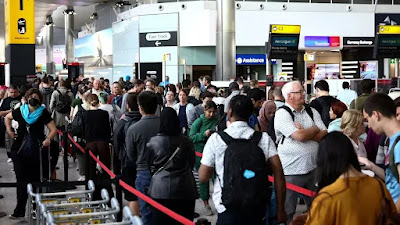The largest airports in Europe have been facing severe disruptions, as close to 400 flights were delayed or cancelled on one extremely hectic summer holiday. Airlines like Air France, Lufthansa, British Airways, Emirates, United Airlines, and others were severely affected in the disruptions. Major world hubs like Amsterdam Schiphol, London Heathrow, Frankfurt International, and Athens International were facing large scale operational disruptions, grounding thousands of passengers or exposing them to long lines.
At Schiphol Airport in Amsterdam, Europe’s third-busiest airport, the ripple effects were felt most acutely. The airport saw 96 flight delays and six cancellations, with KLM Royal Dutch Airlines bearing the brunt of the delays. A total of 43 KLM flights were delayed, and all six cancellations were attributed to its operations. Other airlines, including Delta Air Lines, United Airlines, easyJet, Transavia, Turkish Airlines, American Airlines, and Emirates, also faced delays as the airport struggled to handle the high summer demand. Even cargo carriers were not spared, with some departures delayed by up to 100% of their scheduled time. Ground operations teams reported difficulties in managing tight aircraft turnaround schedules and unscheduled swaps, which led to confusion and frustration among passengers.
London Heathrow, another key European aviation hub, experienced 80 flight delays and three cancellations. British Airways was especially impacted, with 35 delayed flights and one cancellation. United Airlines and American Airlines also experienced setbacks, including two delayed flights and two cancellations. Other carriers such as Virgin Atlantic, Air India, Lufthansa, Delta, and more reported disruptions. Airport officials attributed the delays to runway congestion, short-staffed logistics teams, and tightly packed schedules, particularly affecting transatlantic routes. With summer holiday travel in full swing, the added pressure of high demand exacerbated these bottlenecks.
Meanwhile, Frankfurt International Airport, Germany’s busiest hub and a major base for Lufthansa, saw 126 delays and one cancellation. Lufthansa accounted for 62 of the delayed flights, but other carriers such as Condor, Air Dolomiti, CityJet, Delta, Korean Air, Air Astana, and Turkish Airlines also encountered operational issues. Aircraft repositioning problems, coupled with reduced staff in critical areas like fueling and cargo management, were reported as the primary causes of delays at Frankfurt.
Southern Europe was not immune to the chaos. Athens International Airport recorded 82 delays and two cancellations. Local carriers such as Aegean Airlines, Sky Express, and Olympic Air faced significant disruptions, as did international airlines including Emirates, Lufthansa, ITA Airways, Gulf Air, and Middle East Airlines. The delays were attributed to crew shortages and insufficient turnaround time between flights, which led to a backlog of passengers.
The cumulative impact of these delays and cancellations resulted in 384 delayed flights and 12 cancellations across the four major airports. The disruptions had far-reaching effects, not only on European travel but also on long-haul services bound for destinations in Asia, North America, and the Middle East. Connecting flights and cargo logistics were also delayed, especially for airlines with shared international schedules or code-share agreements.
Industry analysts attribute the ongoing disruptions to several interrelated factors, including chronic staffing shortages at airports, particularly for airside operational roles, and a mismatch between the high post-pandemic demand for travel and underprepared airport infrastructure. Aircraft turnaround inefficiencies, tight slot scheduling, and heavy air traffic control restrictions have added further complexity to the planning and management of flights. Additionally, the start of school holidays across European countries has brought a surge in passenger volumes, exacerbating existing bottlenecks.
Airlines and airports have issued advisories urging passengers to arrive earlier than usual to account for extended wait times. Many airlines have also recommended that passengers use self-check-in kiosks and are providing rebooking notifications through digital platforms. In some instances, passengers whose connections were missed due to delays have been provided with hotel accommodations to mitigate the inconvenience.
Experts warn that without significant interventions to address staffing deficits and streamline airport logistics, similar disruptions could continue throughout the remainder of the summer travel season. While contingency plans have been put in place at several airports, it remains uncertain whether these measures will be sufficient to manage the growing pressure from increasing air traffic.
Airlines that bore the brunt of the disruptions include KLM, British Airways, Lufthansa, Aegean Airlines, Delta Air Lines, United Airlines, Turkish Airlines, Emirates, and Air France. These carriers operate some of the busiest intra-European and intercontinental routes and are particularly vulnerable to cascading delays when flights miss their scheduled slots.
As summer travel keeps bouncing back ahead of schedule, airports and carriers are struggling to maintain pace. Staffing shortages in rapid-turn recruitment, training, and deployment of operational staff have blunted efforts to bring in extra capacity. Analysts predict several quarters could be required for staffing and logistics to catch up, assuming international travel demand persists.
Meanwhile, travelers are advised to keep abreast of the state of their flights frequently, to be in the airport early, and to travel flexibly since Europe’s flight network struggles to regain control of schedules.
Sources:
- Official websites of Schiphol Airport, London Heathrow, Frankfurt International Airport, Athens International Airport
- European Commission
- European Union Aviation Safety Agency (EASA)
- Tags: largest airports Europe flights were delayed or cancelled, Athens International Airport
